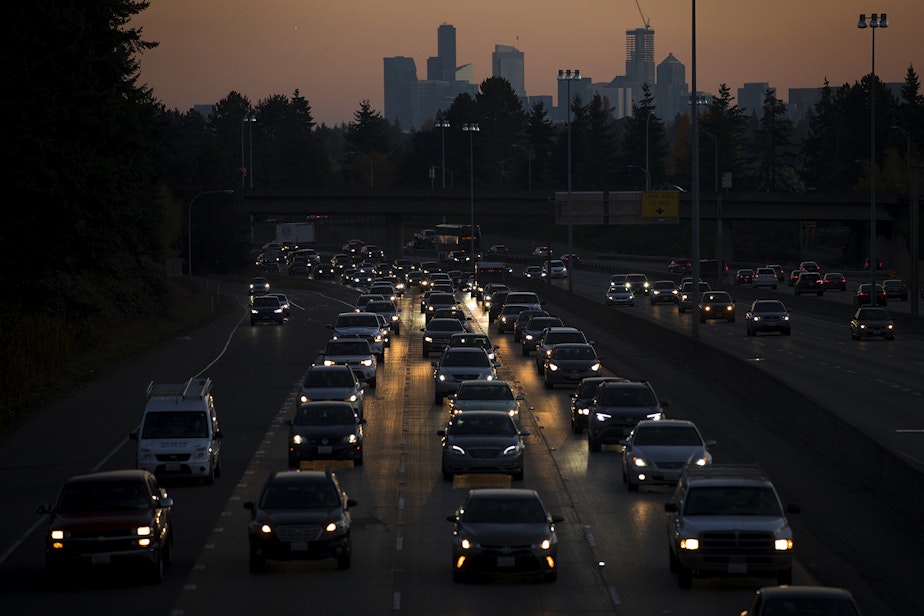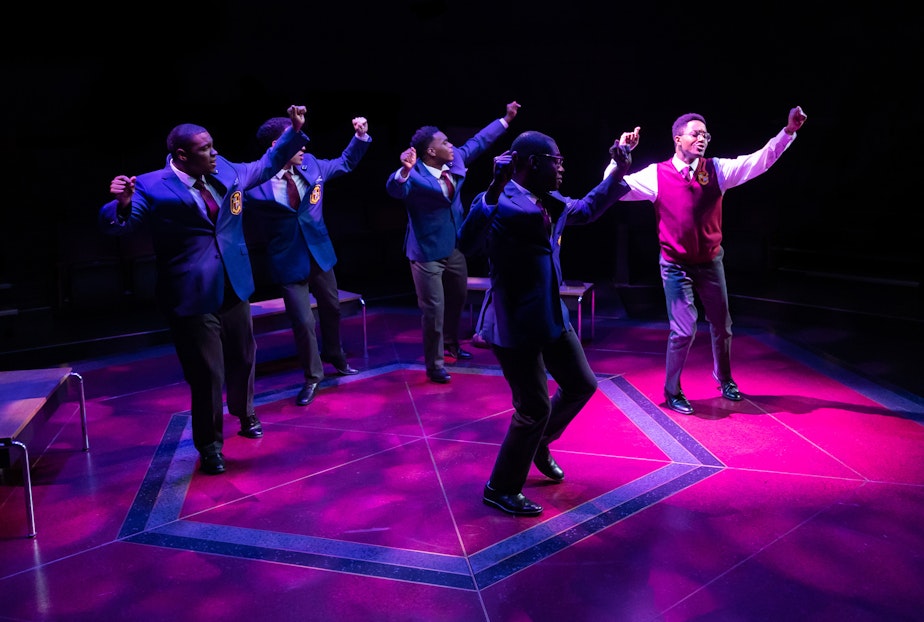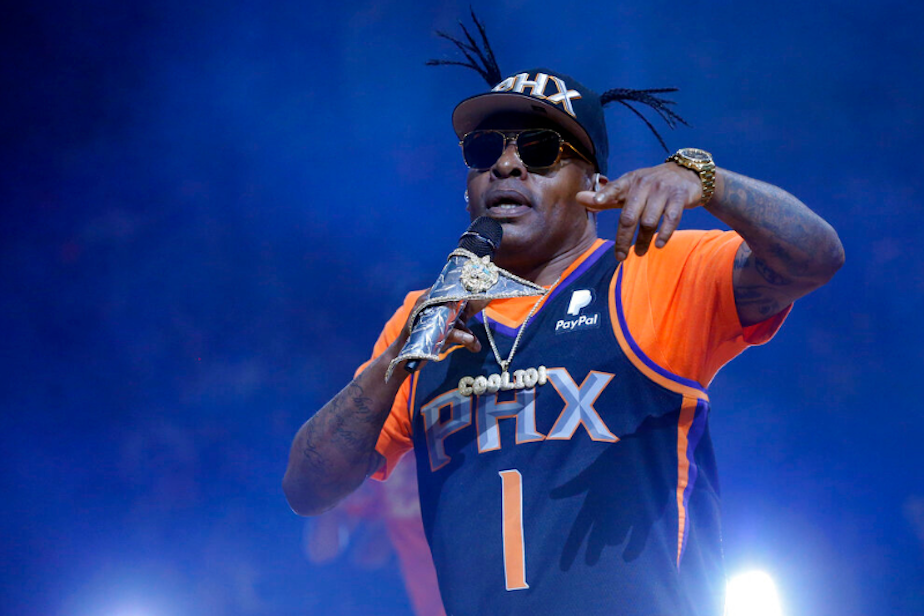Getting around Seattle is no Fantastic Voyage: Today So Far

- Transportation around the Seattle area is likely to get a little rough with construction projects on the road ahead.
- 520 Bridge will be closed this weekend. Expect delays.
- Gas prices are on the rise again.
- Seattle aims to revamp Third Avenue ... again.
This post originally appeared in KUOW's Today So Far newsletter for September 29, 2022.
The Seattle area has ambitious goals when it comes to commuting, transit, and generally getting around. But let's be honest, getting around our region is no Fantastic Voyage. It's not so much Rollin' With My Homies, and more like C U When U Get There ... eventually.
While speaking with KUOW's Seattle Now, Mark Hallenbeck, director of the Washington State Transportation Center, says things in our region aren't likely to get better any time soon. We are looking at a lot of construction down the road.
“Congestion will keep happening ... We built much of our freeway system starting in the 1960s, it hasn’t done a lot of replacement of those things, so they are 20-30 years past their design life. That’s a great thing ... but the bad news is we’re going to have to do construction. Construction on major freeways often is accompanied by congestion — get used to it.”
On top of all that, our region's work habits have changed. More folks are working from home. That means the morning commute has actually gotten better, according to Hallenbeck. Basically, instead of a traffic snarl at 5:30 a.m., it now happens at 6:30 a.m. Afternoon/evening traffic, however, hasn't improved and has gotten worse in some cases. Hallenbeck says remote work is partially responsible. Folks are commuting in the morning, and some of those folks used to take the bus to work. Now, those people are looking to run errands after work, or go to dinner, etc. That means they aren't hopping on a bus, they're getting into a car in the afternoon. That volume is placing a strain on roads.
“Our trip-making behavior has changed to take advantage of this telecommuting that a lot of people are now doing …. as our work schedules kind of settle down, I think you’ll see traffic settle down, and transit will adjust to when people are going to work and not.”
Hallenbeck also notes that our region doesn’t do well when it comes to transit, which is mostly designed to get people to and from work, not so much to the store, dinner, etc. Transit also doesn’t do a good job for commuters coming in from outside Seattle (so I’m not the only one who noticed that).
“Everyone has to compromise a little bit,” Hallenbeck said. “We cannot afford to give everyone a free, fast drive from anywhere they want to live, to anywhere they want to go. There aren’t enough resources to do that, there isn’t enough space to do that. So be prepared to compromise … part of that compromising activity is mixing up our land uses. We need to make it easy for you to go from your house to a medical center to a restaurant, and that means those things need to be closer to where you live. The only way to do that is to put them closer to where you live. So try not to object too much when people put retail relatively near your housing developments … the village of old times are coming back and those are really good things.”
For more insights into our evolving traffic, and current trends, check out Hallenbeck's full conversation with Seattle Now here.
Since we're on the topic, it's probably a good time to remind drivers that the 520 Bridge over Lake Washington will be closed in both directions this weekend. As I heard KUOW's Kim Malcolm report last night, crews are realigning some lanes, which is part of the Montlake lid project. The good news is that the bike and pedestrian lane will still be open. The closure starts at 11 p.m. Friday. The lanes reopen at 5 a.m. Monday.
If you recall, the I-90 bridge across Lake Washington was down last weekend for repairs and that really snarled traffic. The I-90 bridge will be open this weekend, but with the 520 bridge down, you can expect that traffic won't be so Coolio.
For drivers out there, another aspect to consider while you're idling on the freeway is gas prices. Gas prices had been falling for a record 14 weeks earlier this month. GasBuddy reports that trend is over, and they are on the rise. The average price for regular gas in Washington state is $5.17 per gallon (higher than the national average of $3.78), according to AAA. That's up 52 cents from a week ago. The Seattle/Bellevue/Everett average is $5.34, which is up about 50 cents from a week ago. It's a similar story in Tacoma where the average is $5.26, up 63 cents from a week ago. In short, gas is already expensive, and it's getting more expensive. Perhaps it's best to start thinking long term — lifestyle, work style, where to live — to rely less on our cars, because we're not Cruisin' anymore.
In the years ahead, Seattle is looking at traffic disruptions off the freeway, and on downtown streets. The City Council is looking to redevelop Third Avenue and that means construction projects ahead. Seattle Times reporter David Kroman tells KUOW that the city wants to redesign this stretch of downtown to clamp down on crime that seems to persist there. The avenue is a major transit corridor for downtown. It's not used for much else, but it's where a lot of headlines about crime emerge. Read more here.
For years, the problems along Third Avenue have been no secret. When I first reported on this area years ago, workers along the avenue called it "Stab Alley." OK, it's not an alley, but the workers told me their stories of stepping over blood, being grabbed, catcalled, or mugged when walking out the doors to their offices. This was shortly after the city kicked off its "9.5 Block Plan" in 2015. That started with mass arrests, mostly of suspected drug dealers. Those arrested were offered diversion programs. The rest of the plan attempted to reshape the avenue — the bus stops were moved down the street, objects like newspaper boxes were taken away, nearby alleys were closed off, and a barrier went up along the sidewalk which made it much smaller. People simply shuffled quickly along the street after that. You can see the logic behind this plan: Remove anything that encourages people to congregate and use the space. It worked for a while, but the effort also took Third Avenue away from everyone else in downtown. Also, it clearly didn't work in the long run, because here we are again.
The city may be taking a different approach this time. Kroman told KUOW's Kim Malcolm: "The options are geared toward bigger sidewalks, more welcoming storefronts, more space for people to participate in recreation, or retail, or restaurants, or what have you, while also maintaining that space as a transit corridor."
Read more here.
AS SEEN ON KUOW

The cast of "Choir Boy" sing acapella in their performance at ACT Theater in Seattle. Oscar-winning playwright Tarell Alvin McCraney’s play “Choir Boy" is showing at the ACT Theatre. It is a coming-of-age story where none of the characters actually come-of-age – and that is the play’s brilliance. (Courtesy of ACT)
DID YOU KNOW?
As I mentioned earlier this week, National Coffee Day is today! I hope you're celebrating in your own way.
Let's talk about decaf. I understand why it exists, but really, decaf coffee is like putting fuel in your car that doesn't burn; going sailing on a day with no wind; making a '90s hip-hop mix without any Coolio. Decaf is not a modern concept and has been around for more than 100 years. One coffee legend says that, in 1905, German coffee importer Ludwig Roselius got a shipment of unroasted (green) beans that were accidentally soaked in seawater. Not wanting them to go to waste, he gave them a try. The result was a basic cup of coffee (perhaps a bit salty?), but without the usual pep.
Soaking green beans in water is still used to remove caffeine from coffee, but it's not the only way. That same importer, Roselius, kept experimenting and eventually started removing caffeine with benzyne (the stuff in gasoline). That endeavor led to the product Sanka. Benzene isn't used anymore, but ethyl acetate (used in glue and nail polish remover) and methylene chloride (paint removers) are used today.
Another method of taking caffeine out of coffee came along around the 1970s, thanks to another German, Kurt Zosel. He patented a process of using heated carbon dioxide under pressure to remove the caffeine from beans. Another method was invented in the '70s, called the "Swiss Water Process" which essentially soaks green beans in water. Caffeine is filtered out of the water using carbon. Then regular beans are soaked in the filtered water, which draws out all the caffeine.
Naturally caffeine-free coffee plants have been discovered, but so far, nothing so tasty or commercially viable has come along. And it's important to note that while caffeine is removed from the beans, most methods only get 97% of the caffeine, so a tiny bit is left in decaffeinated coffee.
ALSO ON OUR MINDS

The rapper Coolio has died at 59
Coolio, the rapper who was among hip-hop's biggest names of the 1990s with hits including "Gangsta's Paradise" and "Fantastic Voyage," died Wednesday at age 59, his manager said.

